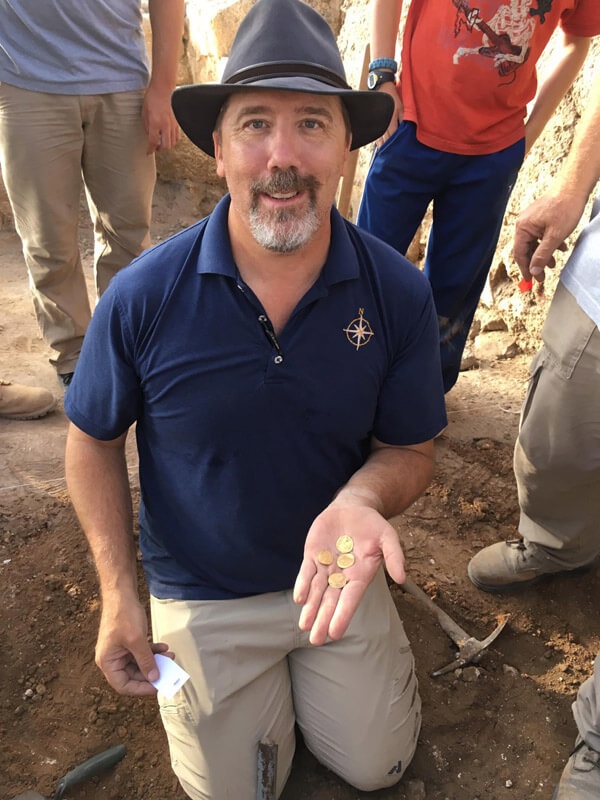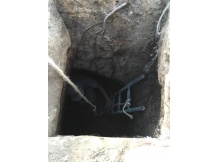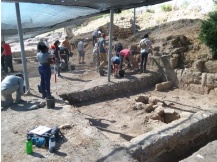
TOP STORY: The "Indiana Jones" of Luther College returns from his latest Mediterranean excavation
(by decorahnews.com's Ben Gardner):
During my interview with Dr. Dan Davis of the classics department at Luther College, I never once made reference to Indiana Jones. This was intentional; because I easily could, and Davis likely hears the reference incessantly.
Davis, in addition to being the head of the classics department at Luther, is also an expert archaeologist, both on land and sea. His summers, over the last three decades, are spent excavating ancient ruins, searching for ancient material evidence, to provide a window for contemporary historians and archaeologists to the ancient world. The past few summers, Davis and Luther students, in partnership with Joseph L. Rife of Vanderbilt, have excavated in the sun-swept harbor city of Caesarea, Israel.
In explaining his archaeological research to me, Davis has the admirable quality of being able to make history vibrant and engaging, while also articulating the nuances of historical context thousands of years in the past.
Davis recently returned to Decorah from his summer in Caesarea. The city, located in the Holy Land on the coast of Israel, was established by King Herod, the Roman appointed king of Judea. Under Roman rule, Caesarea became an important city in the early Jesus movement. The city was subsequently conquered by Byzantines, and then later, in the 7th century, by Muslims. Then during the Crusades, Christians took dominion. Each of these imposing religious and political forces created extravagant architecture and infrastructure, the ruins of which are a treasure-trove of archaeological delights to a guy like Davis.
A giant aqueduct, built by the Romans, spans the city, "marching for mile after mile," Davis says. "The Romans loved to build in marble and stone," Davis notes appreciatively. Romans also built enormous roads, fortress walls, and bathhouses, greatly improving quality of life. Motes and English-inspired barricading were erected following the Crusades.
As a fan of contemporary history books, I appreciate Davis' research because his work with ancient artifacts makes history books come alive. In order to understand how ancient people lived, researchers like Davis and his Luther students have to sift through bucket after bucket of sand and debris, with the hopes of discovering ancient artifacts.
Or, in the case of this summer, it can involve Davis lowering himself by ladder into an ancient abandoned cistern. It is unique to have an intact, hollow cistern preserved for so long. The obvious question for Davis and his colleagues: What was in there? Davis volunteered.
The cistern "was the size of a large walk-in closet," Davis says. They built a special ladder, Davis grabbed a flashlight, and soon he was lowering himself down into the mysterious depths.
Did he find a skeleton? A valuable literary document? Precious stones? Well, in addition to a couple ancient glass lamps, they found trash.
More precisely, Davis says, a three-foot "deep layer of sediment and broken artifacts. The artifacts included several intact ceramic lamps (probably used by the last people to go down into the cistern nearly a thousand years ago), broken ceramic vessels for carrying and storing food, broken ceramic cups, bowls, and plates, and some broken glass vessels (cups & dishes)."
Why would a reserve for water be filled with broken artifacts? Davis believes, during a time of city-disrepair, some of the city's cisterns went out of use. Soon, Davis conjectures, these abandoned vessels would become trash receptacles, especially considering the lack of an organized garbage collection system. With this excavation, ancient trash became archaeological treasure.
It's this sort of anecdotal detail about abandoned cisterns, for instance, that adds texture and nuance to an age very far away from our own.
Much of Davis' recent archaeological work has been on land. He tells me he's excited to change that and get back into the water. He has plans to explore the waters off the coast of Caesarea, describing it as a "halo of shipwrecks."
The coastal waters surrounding Caesarea, Davis says, are riddled with the ruins of ancient shipwrecks. He hopes to explore these ruins and collect evidence to give a fuller picture of the city's maritime history. He hopes to begin this research in the summer of 2021, and is currently looking for interested Luther students. Diving will be required, as will the use of high-tech equipment, including robotic vehicles that will survey the sea's depths before Davis and his crew don their diving gear and explore.
Davis is very excited about this proposed project: he wants to get back into the water. "Joe Rife, my friend and colleague, dragged me out of the water years ago," Davis jokes. He's excited to dive back in.
And exploring shipwrecks off Caesarea isn't the only exciting diving Davis has in the future. He's part of an ongoing expedition in the Pacific Ocean, searching the waters for missing World War II air crews. And he's part of a project, in the development stages, using underwater diving to glean insights into human space flight.
Shortly after arriving at Luther in 2011, Davis recruited a senior Luther student, Joe Thor '12, to assist in compiling a useful field guide to ancient ceramic pottery. Davis saw in his student a like-minded, organized, and industrious classics student. Davis worked as Thor's advisor on his senior project and enjoyed working with Thor so much he invited him to his project aboard the Exploration Vessel Nautilus in the summer of 2012.
Being aboard the Nautilus exploring the Black Sea was a transformative experience for Thor, who, at the time, was a recent college graduate. "It helped me grow, sparked a passion in data within me, and also made me appreciate my home," Thor says.
Thor is now a business and systems analyst for the University of Minnesota. He is still passionate about the classical world, despite being surrounded by code and numbers during his work hours. "I love classics and I will always have a passion for them," Thor says. "Learning Latin and Greek prepared me for [computer programs] SQL and Python. Memorizing the myriad forms of the subjunctive has made me a more effective communicator. Dan let me know that the classics can enrich your life, even if you do not make a career out of it."
Site designed and maintained by Iroc Web Design Services©.
Your Small Business Web Design Solutions.™




